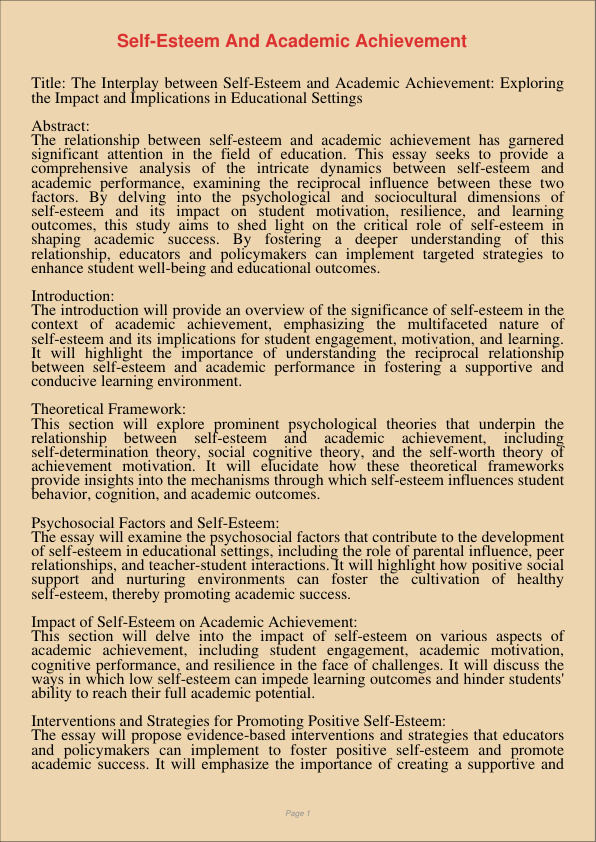SelfEsteem And Academic Achievement
Jan 9, 2024
academic achievement
self
Gender & Sexual Studies
Other
Title: The Interplay between Self-Esteem and Academic Achievement: Exploring the Impact and Implications in Educational Settings
Abstract: The relationship between self-esteem and academic achievement has garnered significant attention in the field of education. This essay seeks to provide a comprehensive analysis of the intricate dynamics between self-esteem and academic performance, examining the reciprocal influence between these two factors. By delving into the psychological and sociocultural dimensions of self-esteem and its impact on student motivation, resilience, and learning outcomes, this study aims to shed light on the critical role of self-esteem in shaping academic success. By fostering a deeper understanding of this relationship, educators and policymakers can implement targeted strategies to enhance student well-being and educational outcomes.
Introduction: The introduction will provide an overview of the significance of self-esteem in the context of academic achievement, emphasizing the multifaceted nature of self-esteem and its implications for student engagement, motivation, and learning. It will highlight the importance of understanding the reciprocal relationship between self-esteem and academic performance in fostering a supportive and conducive learning environment.
Theoretical Framework: This section will explore prominent psychological theories that underpin the relationship between self-esteem and academic achievement, including self-determination theory, social cognitive theory, and the self-worth theory of achievement motivation. It will elucidate how these theoretical frameworks provide insights into the mechanisms through which self-esteem influences student behavior, cognition, and academic outcomes.
Psychosocial Factors and Self-Esteem: The essay will examine the psychosocial factors that contribute to the development of self-esteem in educational settings, including the role of parental influence, peer relationships, and teacher-student interactions. It will highlight how positive social support and nurturing environments can foster the cultivation of healthy self-esteem, thereby promoting academic success.
Impact of Self-Esteem on Academic Achievement: This section will delve into the impact of self-esteem on various aspects of academic achievement, including student engagement, academic motivation, cognitive performance, and resilience in the face of challenges. It will discuss the ways in which low self-esteem can impede learning outcomes and hinder students’ ability to reach their full academic potential.
Interventions and Strategies for Promoting Positive Self-Esteem: The essay will propose evidence-based interventions and strategies that educators and policymakers can implement to foster positive self-esteem and promote academic success. It will emphasize the importance of creating a supportive and inclusive learning environment that nurtures students’ sense of self-worth and fosters a growth mindset.
Cultural and Contextual Considerations: This section will address the cultural and contextual factors that influence the relationship between self-esteem and academic achievement, considering the impact of cultural values, societal norms, and educational policies on students’ self-perception and academic experiences.
Conclusion:
The conclusion will synthesize the key insights presented in the essay, underscoring the reciprocal relationship between self-esteem and academic achievement. It will emphasize the importance of fostering a positive self-image and cultivating a supportive educational environment that nurtures students’ holistic development. Furthermore, it will highlight the implications of this relationship for educational practice and policy, emphasizing the need for targeted interventions that prioritize the promotion of students’ self-esteem to enhance their academic success and overall well-being.
